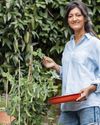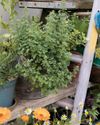
Edible flowers showcase a hidden side of our gardens and give us the chance to unlock an array of flavours and textures, all while creating lots of food for wildlife to enjoy, too. For someone who loves food and has boundless culinary curiosity, these plants provide some incredible and unusual surprises.
You'll be familiar with many of the classic edible flowers - nasturtiums for their watercress-like flavour, borage for its cucumber hit, and the pretty petals of calendula, cornflower and the ever-popular viola. Building on last month's advice, where we explored some of the amazing flavours harnessed from herbs, this month we'll delve deep into the most popular and sought-after flowers on the farm - edible blooms that are more than just pretty petals on a plate, they also champion a range of seasonal flavours and textures.
Classic edible flowers
Many of the flowers you may already be growing can be used in meals. Here, we share some of the most popular and how to best use them
Sunflowers (Helianthus annuus)
Sunflowers have a wonderful nutty flavour. They make up a huge part of our floral salad and in everyday dishes we use them as we would any salad leafy green. Pull petals away from the flowerheads you want to eat and cut back the flowering stems throughout the season to encourage them to keep producing blooms. This is an annual plant that we grow year on year, by collecting and saving their seeds - although we find the birds always beat us to them, which is no bad thing. 'Autumn Beauty' is our favourite mix for a wide range of colours. Best for: salads
Snapdragons (Antirrhinum majus)
Denne historien er fra May 2023-utgaven av BBC Gardeners World.
Start din 7-dagers gratis prøveperiode på Magzter GOLD for å få tilgang til tusenvis av utvalgte premiumhistorier og 9000+ magasiner og aviser.
Allerede abonnent ? Logg på
Denne historien er fra May 2023-utgaven av BBC Gardeners World.
Start din 7-dagers gratis prøveperiode på Magzter GOLD for å få tilgang til tusenvis av utvalgte premiumhistorier og 9000+ magasiner og aviser.
Allerede abonnent? Logg på

A new plot for tasty crops
Taking on a new allotment needn't be hard work. By simply following a few easy tips you can have bumper crops in no time, just like Alessandro Vitale

We love July
July is an island floating between the joy of June and the slightly fatigued month of August. It's a grown-up month: the year has shrugged off its adolescent exuberances, the weather is (hopefully) warm enough for ice cream to be one of your five a day, the sea should be swimmable without (too much) danger of hypothermia and thoughts will be of holiday shenanigans and family barbecues. School's out this month, the next tranche of glorious summer colour is washing across our borders and it's my birthday. Lots of reasons to give three rousing cheers for July!

YOUR PRUNING MONTH
Now, at the height of summer, Frances Tophill shows how to boost your plants' health and productivity with a timely cut

Hassle-free harvests
Flowers are out in abundance this month and for Jack Wallington, many of these blooms make delicious, low-effort pickings

Bite-sized bounties
Glorious doorstep harvests can easily turn into gluts, so let Rukmini Iyer's recipes help you savour every last bit

Upcycled outdoor living
Create unique and stylish garden features for minimal cost using reclaimed materials and simple DIY skills. Helen Riches shares four step-by-step projects and more inspiring eco tips

Secrets of a COLOURFUL GARDEN
Buildings and landscapes can play a vital role in supercharging your space, as Nick Bailey demonstrates

Greening up a city balcony
Looking for sustainable, small-space gardening ideas? Take inspiration from Oliver Hymans' transformed balcony garden in north-east London - now a lush, green haven for humans and wildlife

The dry and mighty garden
As we adapt our gardens to a more volatile climate, Alan Titchmarsh reveals how to create a drought-tolerant plot and picks his top plant performers

Nature knows best
Carol Klein explains how to choose plants for specific growing conditions, based on what has naturally adapted to thrive there